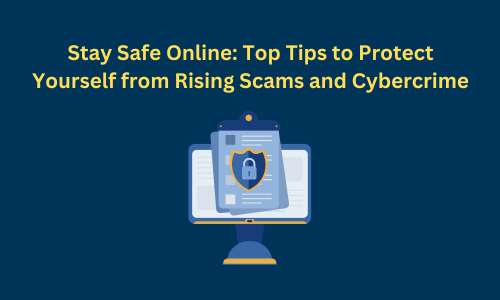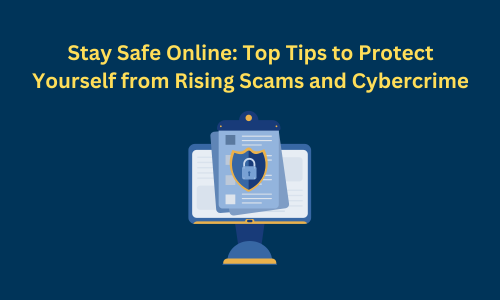Stay Safe Online: Top Tips to Protect Yourself from Rising Scams and Cybercrime

In today's digital world, scams and cybercrime are growing at an alarming rate, targeting individuals, businesses, and even governments. Hackers and fraudsters are constantly developing new ways to exploit people’s data, money, and privacy. Whether you’re shopping online, checking your emails, or using social media, it’s crucial to adopt habits that protect you from cyber threats. Here are the top tips to help you stay safe online and avoid falling victim to cybercrime.
1. Strengthen Your Passwords
Weak passwords are a cybercriminal’s dream. Using “password123” or “qwerty” is like leaving your front door wide open for thieves. To protect your accounts:
- Use strong, unique passwords that mix uppercase and lowercase letters, numbers, and special characters.
- Avoid using the same password across multiple platforms. If one account gets hacked, others are at risk.
- Password managers are a great tool for generating and storing complex passwords, so you don’t have to remember them all.
- Always enable Two-Factor Authentication (2FA) when available. This adds an extra layer of security by requiring not just your password, but also a code sent to your phone or email.
2. Beware of Phishing Scams
Phishing remains one of the most common forms of cyberattacks. Scammers pose as legitimate companies, sending emails, texts, or even phone calls to trick you into providing personal or financial information.
- Check for red flags in emails: look for grammatical errors, unfamiliar email addresses, or a sense of urgency (e.g., “Act now!” or “Your account will be deactivated!”).
- Hover over links to check if the URL matches the supposed sender. Fraudulent links often resemble official sites but with subtle changes.
- Never share sensitive information via email or text unless you are absolutely sure of the recipient’s identity. If in doubt, contact the company directly through their official website or customer service number.
3. Browse Safely
It’s easy to stumble upon malicious websites or download harmful files without realizing it.
- Always make sure the website you’re visiting uses HTTPS (you’ll see a padlock symbol in the URL bar). This ensures that the data exchanged between you and the website is encrypted.
- Avoid using public Wi-Fi for sensitive activities like banking or online shopping, as these networks are often unencrypted and can be easily hacked. If you must use public Wi-Fi, consider a Virtual Private Network (VPN) to encrypt your internet connection.
- Be cautious with pop-ups or flashy ads that promise rewards or alert you to fake security breaches. These often lead to malware or phishing sites.
4. Keep Your Devices and Software Updated
Cybercriminals exploit vulnerabilities in outdated software to gain access to your devices or accounts.
- Update your operating system, apps, and security software regularly. These updates often contain patches for newly discovered security flaws.
- If available, enable automatic updates to ensure you’re always protected with the latest security features.
5. Guard Your Personal Information
It’s tempting to share details about your life on social media, but oversharing can make you a target for identity theft or scams.
- Limit the amount of personal information you post online, like your full name, birthdate, or address. Scammers can use this information to impersonate you or answer security questions to gain access to your accounts.
- Regularly review your privacy settings on social media platforms to control who can view your posts and personal information.
6. Be Careful with Downloads
Downloading files, apps, or software from untrusted sources is a major risk.
- Only download apps or files from official sources, such as verified app stores or the company’s official website.
- Be sure to scan files for malware before opening them, especially if they come from unfamiliar sources. Antivirus software can help detect and remove malicious files.
7. Avoid Financial Scams
Financial scams are becoming more sophisticated and harder to spot. Cybercriminals might offer fake investment opportunities, job offers, or services in exchange for upfront payment.
- Be sceptical of unsolicited offers that promise easy money or demand immediate payment. If something sounds too good to be true, it probably is.
- Use secure payment methods like credit cards or trusted services such as PayPal, which offer fraud protection. Avoid wire transfers or sending money to people you don’t know.
8. Stay Informed About Cyber Threats
Cybercriminals constantly adapt their tactics, so it’s important to stay ahead of the game by being aware of new threats.
- Educate yourself about the latest scams and cybercrime trends by following cybersecurity blogs, news outlets, or government resources like the Federal Trade Commission (FTC).
- If you suspect you’ve been targeted by a scam, report it to the relevant authorities or cybercrime agencies. Reporting suspicious activity helps protect others and disrupt criminal networks.
9. Backup Your Data Regularly
Whether it’s a malicious virus or hardware failure, data loss can happen at any time.
- Regularly backup your important files to an external hard drive or a cloud storage service. This will ensure you can recover your data if your device gets compromised.
- For extra security, consider having both online and offline backups, so you always have access to your data in case of a cyberattack like ransomware.
10. Understand Social Engineering Tactics
Social engineering involves manipulating people into giving up personal information by playing on emotions like fear, urgency, or trust.
- Scammers often impersonate authority figures, such as tech support agents or bank representatives, to trick you into revealing your credentials.
- Always question unusual requests, even if they come from people you know. It’s better to double-check than fall victim to a scam.
11. Use Security Tools
Technology can help safeguard your online presence.
- Install antivirus and anti-malware software to detect and block potential threats.
- A VPN (Virtual Private Network) can protect your privacy, especially on public networks, by encrypting your internet traffic and masking your IP address.
Final Thoughts
Staying safe online is more important than ever in the face of rising scams and cybercrime. By following these tips, you can significantly reduce your chances of becoming a victim. Remember, online safety isn’t just about protecting your data — it’s about being proactive and vigilant in a rapidly evolving digital world. Stay informed, stay secure, and always question the unexpected.
Stay safe out there!
Disclaimer: This article is provided for informational purposes only. It is not offered or intended to be used as legal, tax, investment, financial, or other advice.




